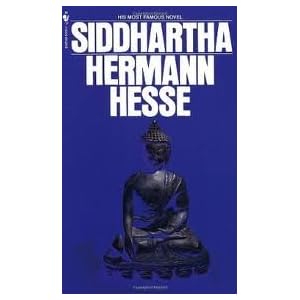Siddhartha, by Hermann Hesse, was the first explicitly spiritual book I read that grabbed me. Actually, such books make a pretty short list —explicit spirituality tends to turn me off in prose.
The last time I read it through was probably in college. I wrote a paper for Religion 101 about viewing the novel through the lens of the seven Kundalini chakras. In coonventional kundalini practices, the goal is an upward movement from root (animalistic tooth-and-claw existence, centered in the anal area) up through the body and out of the crown (the top of the head, representing unity with universal consciousness). My point was that the character of Siddhartha begins as a young Brahmin living in those top chakras, without really living into the worldly chakras. Then he shifts course and becomes a successful businessman and lover. Finally, in despair, he finds a middle road, a balance point centered in the direct experience and love of other people. Once his heart is full, he can understand the unity of all...
That was when I was 20.
On rereading it, I tried summarizing the plot to Ingrid, who asked, "Does he have anyone?" And the answer is, not really. Not as a companion. Indeed it's a major point of his journey that he lose his childhood best friend, his lover, and his son. Only the loss of his son really breaks his heart.
Siddhartha's journey is one I think I internalized as a model for a "spiritual path," and it is really a problem... that the path is about going solo. Not that there's anything inherently wrong with going solo, and it does make it more possible to follow the thread through the labyrinth, making the sharp corner turns that that kind of devotion to a path implies. But it does imply that the "true path" is a lonely one.
One of the books I'll be reading later, Diana Wynne Jones's Homeward Bounders, makes as similarly bleak point... the narrator's final line is "But you wouldn't believe how lonely you get."
There's something off about this. I buy Siddhartha's journey as absolutely authentic to who he is, but it's worth noting that his final teacher, the one who shows him how to listen and understand the river of time as one unity, is a widower and ferryman, not a lonely hunter. Vasudeva had been happily married. No, the point is more that this lonely path was Siddhartha's choice. There was something in him that demanded he go solo, not in the path towards full enlightenment.
But I was reminded what a beautiful book this is. At each stage, Siddhartha goes through anguishes of despair, followed by a liberating joy in what is to come and in having become something new. That's the other thing that strikes me now... how many times in his life he felt the joy of "now I've finally gotten it right!" It made me think how great it would be to bottle that specific feeling, separate from actually discovering something new. I'd love to see a philosopher or psychologist of religion looking just at that transformative moment.
I also am sorry for his father and wife and son. I can't imagine it's a great thing to love someone whose spiritual path is higher than you.

No comments:
Post a Comment
Thanks for contributing. I post pretty much anything that isn't spam—that's really the only reason I moderate comments. So say whatever you want, as long as you aren't trying to literally sell me something.